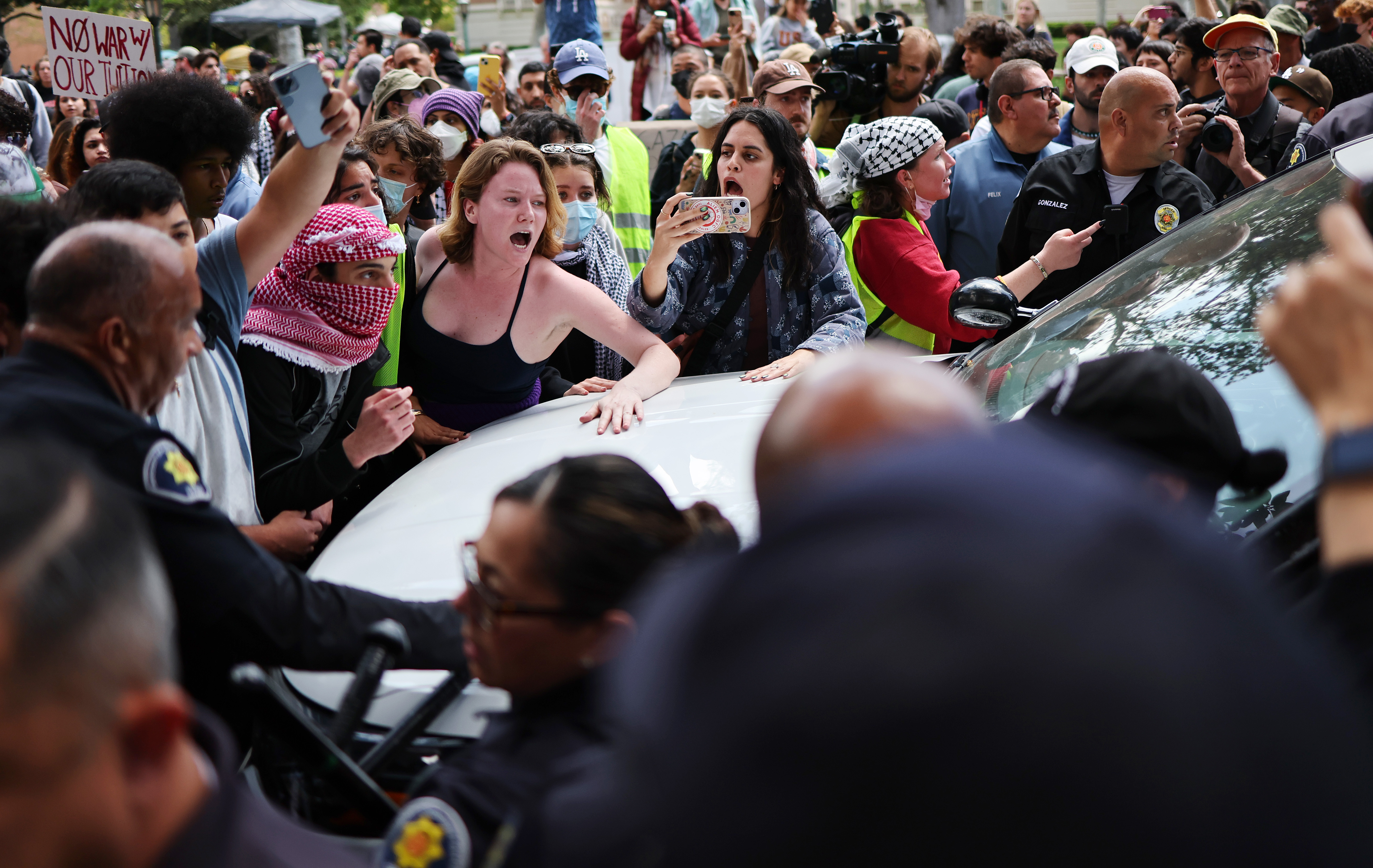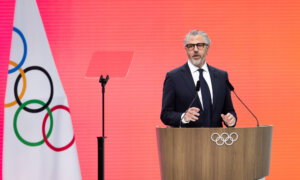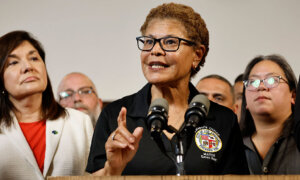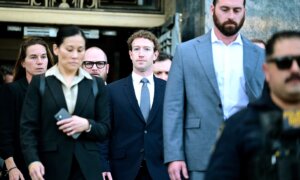LOS ANGELES—USC’s campus will remain closed to the general public April 25 until further notice, although classes will go on as scheduled, one day after nearly 100 people were arrested when police cleared an “occupation” of USC’s Alumni Park by pro-Palestinian protesters demanding that the university end ties with Israel and Israeli-tied investments.
“The protest on the UPC has ended. However, the campus remains closed until further notice. Students, faculty, staff, and people with business on campus may enter with proper identification,” USC said in a statement issued at 10:58 p.m. Wednesday.
By early Wednesday evening, 93 people who refused to leave the park after multiple dispersal orders were arrested peacefully, according to the Los Angeles Police Department.
The occupation action added USC to a growing list of college campuses across the nation that have seen encampments and protests over the Israel-Hamas war, most notably Columbia University. USC’s Alumni Park is scheduled to host the university’s already headline-making commencement ceremony on May 10.
Organizers of the USC occupation—identifying themselves as the USC Divest from Death Coalition—issued a statement saying the action is “in solidarity with the people of Palestine as they resist genocide and continue in their struggle for liberation.”
“The occupation is also in resistance to attempts by USC and other universities to suppress the student movement for Palestine on its campuses, in resistance to the silencing of students that criticize the State of Israel, in resistance to the university administrators and boards of trustees who profit off the genocide of Palestinians,” organizers said.
In part, the group demanded university divestment from organizations that “profit from Israeli apartheid, genocide and occupation in Palestine.”
As the crowd swelled throughout the morning, USC closed the gates to campus and barred access for any unauthorized visitors and non-students or staff.

Pro-Palestinian students march and hold signs as they protest the Israel-Hamas war on the campus of the University of Southern California in Los Angeles on April 24, 2024. (Frederic J. Brown/AFP via Getty Images)
Some unrest developed around midday when the USC Department of Public Safety moved in to confiscate prohibited items, such as microphones and tents. Some shouting matches between protesters and officers ensued, and some protesters picked up their tents and carried them around the park to prevent them from being confiscated.
As the standoff intensified and officers tried to detain a protester, hundreds of people amassed around a DPS patrol vehicle, chanting and shoving forward. The group ultimately moved back into Alumni Park and began marching and shouting slogans, while some DPS officers formed a small skirmish line on the outskirts of the park. The person who had been detained was released.
USC Provost Andrew Guzman wrote in a message to the campus community Wednesday afternoon that protesters’ “actions have escalated to include acts of vandalism, defacing campus buildings and structures, as well as physical confrontation that threatens the safety of our officers and campus community.”
By mid-afternoon, the gathering had returned to a mostly peaceful posture, with about 200 protesters marching through and later sitting in the park.
In his statement Wednesday afternoon, Mr. Guzman noted that the university has a ban on erecting tents or other encampments on the campus, along with a ban on the “use of loudspeakers, signs on poles or stakes and the disruption of classes and other essential functions of the university.”
Mr. Guzman said the protest participants—“many of whom do not appear to be affiliated with USC”—were repeatedly asked to adhere to the campus rules by removing tents and other prohibited items.
Some Jewish students interviewed on campus said they feared for their safety, accusing the crowd of shouting antisemitic slogans as they protested.
“We want to be clear that we reject speech that is hateful and that causes harm to others,” Mr. Guzman wrote in his statement. “In these challenging times, we call on the Trojan Family to remember that every member of our community is deserving of respect, has the right to be safe on campus, take classes, and participate in other campus activities without fear of harassment or bullying.
“It should be everyone’s priority to treat each other with kindness and care.”

Faculty join pro-Palestinian students as they protest the Israel-Hamas war on the campus of the University of Southern California in Los Angeles, on April 24, 2024. (Frederic J. Brown/AFP via Getty Images)
Mr. Guzman’s statement did not address any of the demands put forth by protest organizers. Those demands included a complete academic boycott of Israel, including an end to study-abroad programs and cutting ties with Israeli universities; protection of free speech of students voicing support for Palestine; and demanding the university issue a public statement “calling for an immediate, permanent ceasefire in Gaza, denouncing the ongoing genocidal campaign against the Palestinian people and call on government officials to do so too.”
Shortly after 5 p.m., campus security began issuing dispersal orders to the group, saying anyone who did not vacate the area would be arrested for criminal trespassing. Hundreds of LAPD officers who had been amassing outside the campus then began marching toward the park, establishing a perimeter around the area.
As the police presence escalated, many people cleared out of the park, but continued to linger around the perimeter, leading to some isolated skirmishes with groups of officers. Video from the scene showed water bottles being hurled toward police, and at least one person was seen being handcuffed.
A core group of about 50 or more people remained in Alumni Park, prepared to be arrested. Some of them sat in a circle, wearing masks and goggles—with bottles of what appeared to be milk nearby in apparent anticipation of being pepper-sprayed. Others in the group stood with their arms linked.
Around 6:30 p.m., police began moving in and arresting people in the park. The core group of protesters surrendered peacefully one-by-one.
Some protesters who had been on campus also began gathering in intersections just off campus, blocking traffic. Around 6 p.m., a group of protesters was stationed in the intersection of Jefferson Boulevard and Hoover Street, bringing traffic to a halt.
Hundreds of people continued to linger on the outskirts of Alumni Park while police completed the arrests. It was unclear how many people who took part in Wednesday’s demonstration were actually USC students.
Although classes were set to resume as usual Thursday, officials noted that the university’s individual college deans can exercise their discretion in determining whether to hold courses in person or online.
USC made national headlines over its decision to bar pro-Palestinian valedictorian Asna Tabassum from speaking at the May 10 commencement ceremony. The move came following complaints about some of Ms. Tabassum’s online posts, including a link to a website advocating the abolition of Israel.
University officials insisted the decision was done not for political reasons, but due to security concerns, given the “alarming tenor” of discourse. Organizations including the Muslim Public Affairs Council, the Council on American-Islamic Relations-Los Angeles and the ACLU of Southern California denounced the decision and demanded the university reverse course and allow Ms. Tabassum to speak.
On Friday, USC announced that it is “redesigning the commencement program,” and it will no longer include any outside speakers or honorees.
Filmmaker Jon M. Chu had been scheduled to be the main commencement speaker during the May 10 event. Honorary degrees were expected to be presented to Mr. Chu, National Endowment for the Arts Chair Maria Rosario Jackson, tennis legend Billie Jean King and National Academy of Sciences President Marcia McNutt.
The university said it will “confer these honorary degrees at a future commencement or other academic ceremonies.”

Pro-Palestine demonstrators march at an encampment in support of Gaza at the University of Southern California in Los Angeles on April 24, 2024. (Mario Tama/Getty Images)
Also on Friday, 11 members of the university’s Advisory Committee on Muslim Life at USC resigned in protest over the cancellation of the valedictorian’s speech. The group is scheduled to hold a news conference Thursday.
Last Thursday, hundreds of people—including students and some university staff—took part in a march and rally on the USC campus to protest the decision not to allow Ms. Tabassum to speak at commencement.
Ms. Tabassum said in a statement that “anti-Muslim and anti-Palestinian voices have subjected me to a campaign of racist hatred because of my uncompromising belief in human rights for all.”
“I am both shocked by this decision and profoundly disappointed that the university is succumbing to a campaign of hate meant to silence my voice,” she said. “I am not surprised by those who attempt to propagate hatred. I am surprised that my own university—my home for four years—has abandoned me.”
Mr. Guzman insisted in his original message announcing the decision that barring Ms. Tabassum from speaking in no way diminished “the remarkable academic achievements of any student considered or selected for valedictorian. To be clear: this decision has nothing to do with freedom of speech. There is no free- speech entitlement to speak at a commencement. The issue here is how best to maintain campus security and safety, period.”
He added, “The intensity of feelings, fueled by both social media and the ongoing conflict in the Middle East, has grown to include many voices outside of USC and has escalated to the point of creating substantial risks relating to security and disruption at commencement. We cannot ignore the fact that similar risks have led to harassment and even violence at other campuses.”
Late Wednesday afternoon, the Jewish Federation Los Angeles issued a statement calling protests at USC and other college campuses across the nation “alarming.”
“Antisemitism, hate, and intolerance towards Jewish students has no place on any campus,” according to the federation. “JFEDLA is working to ensure the safety of every Jewish student across Los Angeles. While we believe in peaceful civic discourse, these protests have escalated to the point of creating a dangerous climate for Jews on campus.”
Earlier Wednesday, Israeli Prime Minister Benjamin Netanyahu spoke about the U.S. college protests, saying, “What’s happening in America’s college campuses is horrific. Antisemitic mobs have taken over leading universities. They call for the annihilation of Israel. They attack Jewish students. They attack Jewish faculty.”
CAIR-LA, meanwhile, issued another statement Wednesday condemning what it called “excessive force” being used against protesters.
“It is deeply concerning that USC’s response to students demonstrating peacefully in solidarity with Palestine is forcible suppression of free speech and assembly,” CAIR-LA legal director Amr Shabaik said in a statement.
“This mirrors a nationwide trend of colleges and universities attempting to censor pro-Palestine advocacy on campuses. All students should feel safe while expressing their views and engaging in their right to assemble peacefully. We demand USC immediately cease any further acts of repression against the protesters and take action to respect and protect the speech of its students.”













